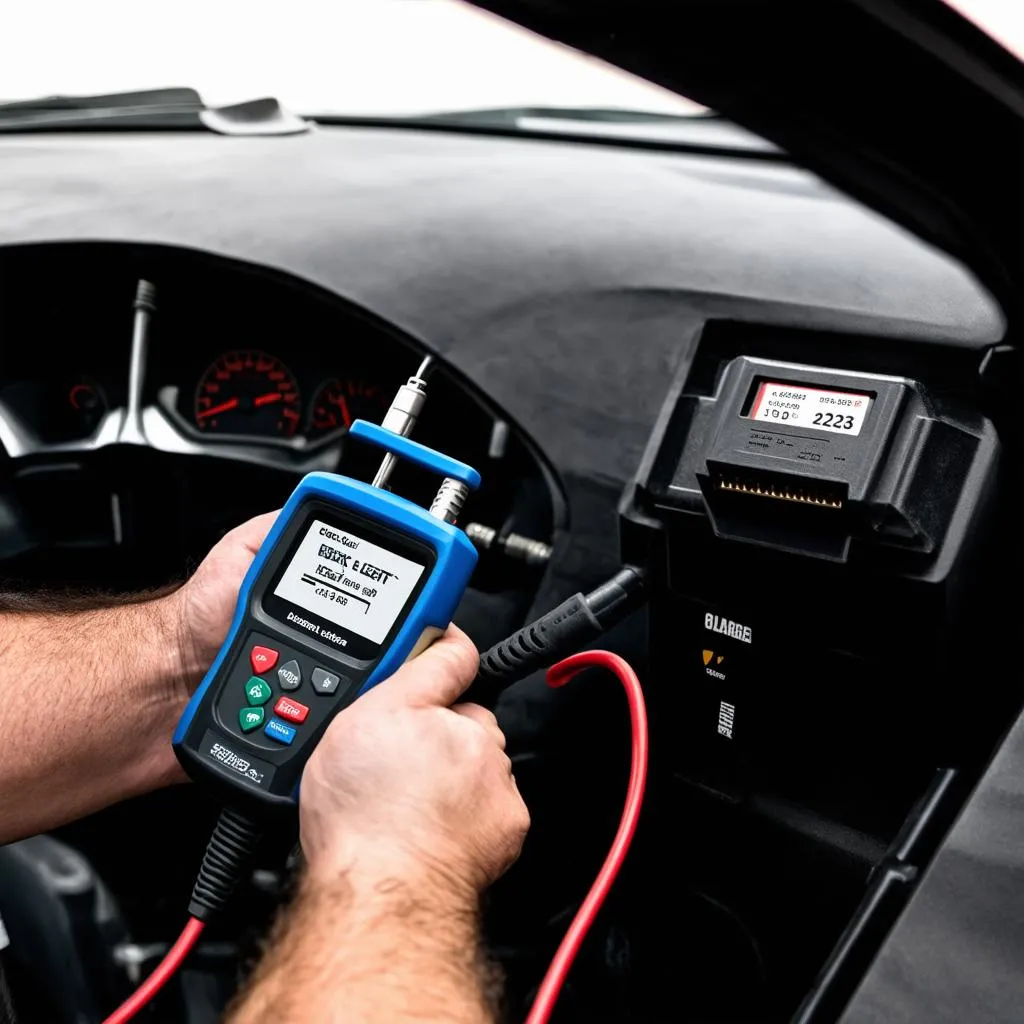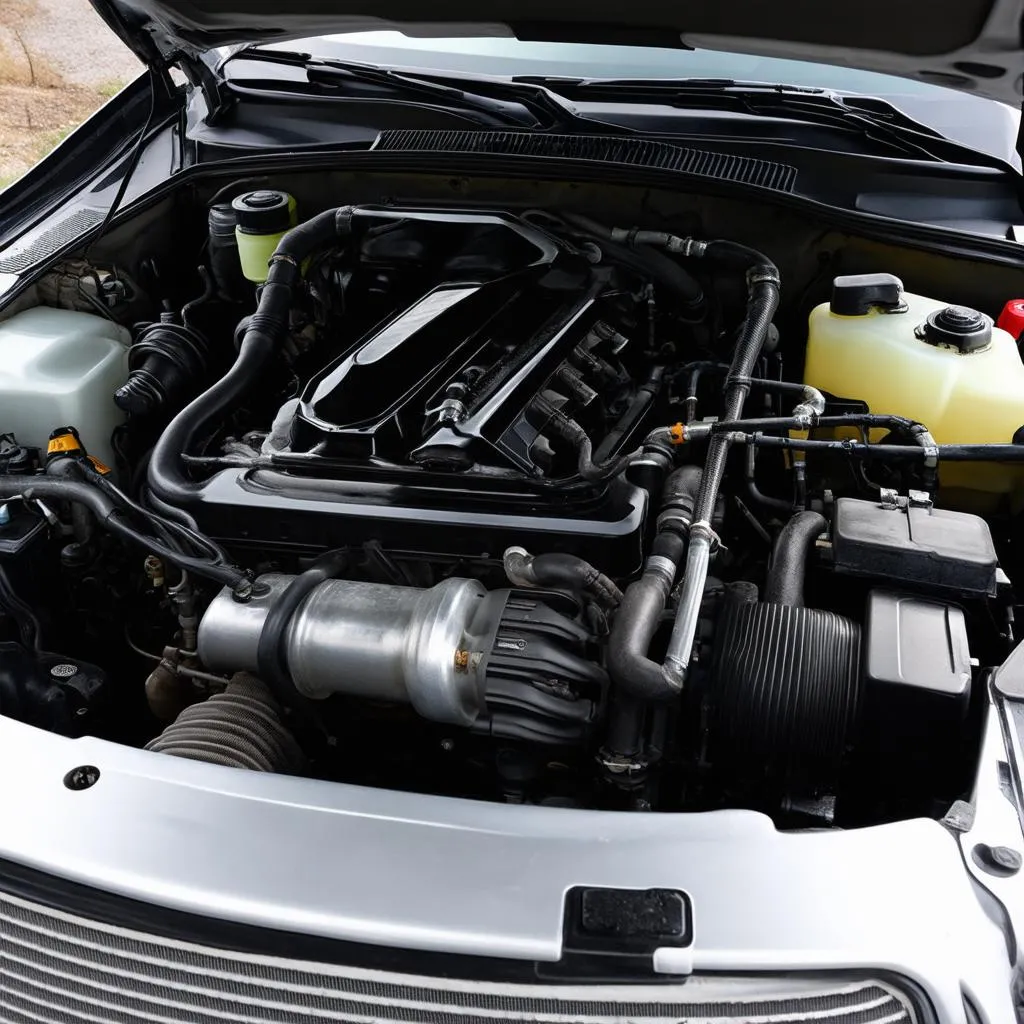“My check engine light came on, and now this code P1C4E is staring back at me from the OBD reader. What does it all mean?!”
If you’re a Chrysler owner, this scenario might sound a tad too familiar. Don’t worry, you’re not alone. The cryptic world of OBD codes can seem daunting, but we’re here to demystify it for you. Specifically, we’ll dive deep into the Chrysler OBD code P1C4E, exploring its meaning, causes, symptoms, and solutions.
Decoding the Mystery: What is Chrysler OBD Code P1C4E?
Let’s break down this code like a seasoned mechanic dissecting an engine.
“P1C4E” indicates a problem with your Chrysler’s Hybrid Battery Pack Cooling System Performance. This system is crucial for maintaining the optimal temperature of your hybrid battery, ensuring its longevity and performance.
Think of it like this: imagine driving through the Nevada desert in August with a faulty car radiator. Your engine would overheat, right? The same principle applies to your hybrid battery; without proper cooling, it can overheat and suffer damage.
Why This Code Matters: The Implications of Ignoring P1C4E
Ignoring this code is like ignoring a flashing “low fuel” warning – eventually, you’re going to be stuck on the side of the road. In the case of P1C4E, ignoring it can lead to:
- Reduced Fuel Efficiency: An overheating battery can’t perform at its best, leading to decreased fuel economy.
- Costly Repairs: Ignoring the issue can lead to severe damage to your hybrid battery, which translates to a hefty repair bill.
- Breakdown Risks: In extreme cases, a malfunctioning cooling system can cause your Chrysler to completely shut down, leaving you stranded.
Common Symptoms of OBD Code P1C4E
While the check engine light is a telltale sign, here are some other symptoms that might pop up alongside P1C4E:
- Decreased Fuel Economy
- Fluctuations in Hybrid System Performance
- Visible Warning Lights on your Dashboard (e.g., Hybrid System Warning Light)
- Engine Overheating
Troubleshooting P1C4E: Unraveling the Root Cause
Several culprits could be triggering the P1C4E code. Here are some of the most common:
- Faulty Cooling Fan: The cooling fan plays a vital role in regulating battery temperature. A malfunctioning fan can disrupt this process, triggering the code.
- Clogged Cooling System: Over time, dirt and debris can accumulate in the cooling system, hindering coolant flow and leading to overheating.
- Low Coolant Level: Like your car’s engine, the hybrid battery relies on coolant to stay cool. Low coolant levels can trigger the P1C4E code.
- Faulty Temperature Sensor: The temperature sensor acts as the eyes and ears of the cooling system, monitoring the battery’s temperature. A faulty sensor might send inaccurate readings, causing the system to malfunction.
- Damaged Wiring or Connectors: Damaged wiring or loose connectors within the cooling system can disrupt communication and lead to operational errors.
Seeking Professional Help: When to Consult an Expert
“Can I fix this myself?” you might be wondering. While some car enthusiasts enjoy the challenge of DIY repairs, the P1C4E code often requires specialized knowledge and tools best left to professionals.
Consider seeking help from a qualified mechanic, especially if:
- You’re uncomfortable working with hybrid vehicle systems.
- You lack the necessary diagnostic tools.
- The problem persists even after attempting basic troubleshooting.
Preventing Future Occurrences: Proactive Steps for a Healthy Hybrid System
Prevention is always better than cure. Here are some tips to keep your Chrysler’s hybrid system happy and code-free:
- Regular Maintenance: Stick to your Chrysler’s recommended maintenance schedule. Regular checkups can identify potential issues before they escalate.
- Coolant Checks: Periodically check your coolant levels and top them off as needed.
- Visual Inspections: Take a few minutes to visually inspect your hybrid battery cooling system for any signs of damage, leaks, or loose connections.
FAQs About Chrysler OBD Code P1C4E
Q: Is it safe to drive with the P1C4E code?
A: While you might be able to drive for a short distance, it’s not recommended. Driving with a potential hybrid battery cooling system issue can lead to further damage and costly repairs down the line.
Q: Can a faulty 12V battery trigger the P1C4E code?
A: While a weak 12V battery can cause various electrical gremlins in your Chrysler, it’s unlikely to directly trigger the P1C4E code. This code specifically relates to the hybrid battery pack cooling system.
Q: How much does it cost to fix the P1C4E code?
A: The repair cost can vary greatly depending on the root cause and the chosen repair shop. It’s best to get a quote from a trusted mechanic after they’ve diagnosed the specific problem.
 Car Diagnostic Tool
Car Diagnostic Tool
Beyond P1C4E: Exploring Related Chrysler OBD Codes
The P1C4E code is just one piece of the puzzle. Here are some related codes that often appear alongside or indicate similar issues:
- P0A80: Hybrid Battery Pack Deterioration
- P0A7F: Hybrid Battery Pack Cooling System
- P0117: Engine Coolant Temperature Sensor Circuit Low Input
 Car Cooling System
Car Cooling System
Need More Help? We’re Just a Message Away!
Dealing with car troubles can be stressful. If you’re grappling with the P1C4E code or any other automotive mysteries, don’t hesitate to reach out to our team of experts via WhatsApp at +84767531508. We’re available 24/7 to provide guidance, answer your questions, and connect you with the right resources.
Remember, a little knowledge goes a long way in keeping your Chrysler running smoothly. Safe travels!
